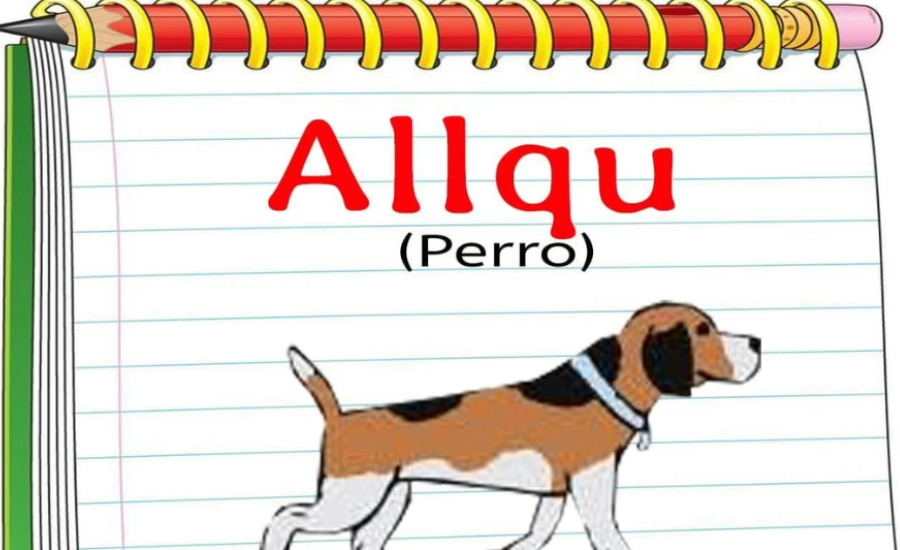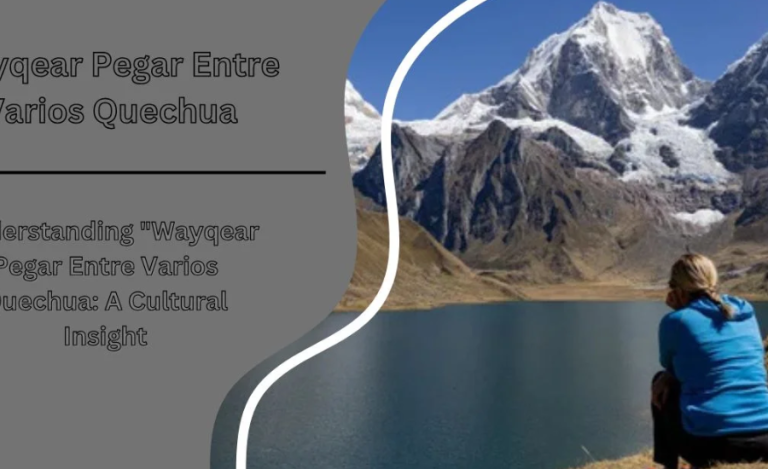wayqear pegar entre varios quechua spoken by millions across the Andes, holds expressions that reveal its people’s values and worldview. A notable phrase, “Wayqear Pegar Entre Varios Quechua,” captures the essence of community collaboration, emphasizing the spirit of working together toward shared goals. This phrase embodies much more than teamwork; it reflects a foundational belief in unity and mutual support as key elements in overcoming life’s challenges. Deeply rooted in the communal ethos of Andean culture, it underscores the importance of collective strength and cooperation, values that have defined Quechua society for centuries.
Wayqear Pegar Entre Varios Quechua: A Bond of Unity and Strength
The phrase “Wayqear Pegar Entre Varios Quechua” blends Quechua and Spanish, a linguistic mix commonly found in Andean regions shaped by both indigenous and colonial influences. In Quechua, “Wayqear” refers to a “brother” or “close friend,” and the Spanish “pegar entre varios” translates to “to stick together among many.” Together, this phrase beautifully encapsulates the concept of close companions uniting to overcome challenges or pursue shared goals. It signifies more than just group work—it reflects deep loyalty, mutual support, and the belief that unity strengthens individuals. This expression is a testament to Andean values of kinship, resilience, and the power of collective effort.
Wayqear Pegar and the Spirit of Ayni in Quechua Culture
In traditional Quechua culture, community life has long been anchored in principles of reciprocity and shared labor. Many essential tasks, especially in agricultural settings, demand collective effort, whether harvesting fields or constructing infrastructure. “Wayqear Pegar Entre Varios” embodies this communal approach, deeply woven into a lifestyle where collaboration is key to survival and success.
At the heart of this expression is the concept of “ayni,” a Quechua system of mutual assistance that ensures all members contribute to and benefit from the community’s shared work. This system has sustained Andean communities for generations, enabling them to thrive in challenging environments by embracing unity and collective resilience.
Ayni and the Strength of Unity in Quechua Culture

In Quechua communities, “ayni” represents more than mutual support—it’s a fundamental social obligation. Rooted in the spirit of reciprocity, ayni requires individuals to return the help they receive, fostering a strong network of interdependence and ensuring no one is left without support. This principle underpins “Wayqear Pegar Entre Varios,” reinforcing the idea that unity and collective effort are essential to achieving community goals.
In agriculture, ayni is indispensable. Planting, harvesting, caring for animals, and maintaining communal lands often demand the hands of many, highlighting the importance of working together. “Wayqear Pegar Entre Varios” is a testament to this tradition, capturing the belief that collective action paves the way for success.
While modernity has influenced Quechua communities, the values expressed in “Wayqear Pegar Entre Varios” continue to resonate. In rural areas, collective work remains essential for building homes, managing resources, and organizing events. Even in urban spaces, Quechua speakers honor these collaborative principles in their businesses and social initiatives.
This commitment to cooperation demonstrates the resilience of Quechua cultural identity. Through mutual effort, individuals not only reach their shared objectives but also strengthen their heritage and cultural bonds, preserving a legacy of unity and mutual support.
Preserving Quechua Culture Through “Wayqear Pegar Entre Varios”
Language as a Vessel of Tradition
The Quechua language is crucial for preserving the heritage and identity of the Andean people. Expressions like “Wayqear Pegar Entre Varios” go beyond words—they embody the cultural practices and values sustained over centuries. Protecting the Quechua language is essential to maintaining these rich traditions.
In recent years, interest in Quechua has grown, with language schools, cultural programs, and digital platforms playing a key role in its revival. Teaching phrases like “Wayqear Pegar Entre Varios” passes down both the language and the communal values it upholds, inspiring younger generations to connect with their cultural roots.
Collective Values in a Globalized World
In today’s interconnected world, the collaborative spirit in “Wayqear Pegar Entre Varios” holds valuable lessons. From businesses to social movements, the Quechua approach to unity and mutual aid offers a framework for success, emphasizing that people are stronger together. This expression reminds us that shared effort and responsibility can lead to achievements far greater than those reached alone. By embracing collaboration, we strengthen our communities and create meaningful progress in a complex world.
Quechua Language: A Guardian of Cultural Values
Quechua as a Reflection of Andean Values
Quechua represents far more than words; it embodies an Andean worldview where nature, community, and spirituality are intricately woven together. Expressions like “Wayqear Pegar Entre Varios Quechua” hold cultural wisdom passed down through generations, teaching values of cooperation, respect, and communal harmony. By preserving the Quechua language, we also protect these principles that have supported Andean societies for centuries.
Revitalizing Quechua for Future Generations
In recent years, efforts to revitalize Quechua have expanded, with schools in Peru, Bolivia, Ecuador, and other Andean regions integrating it into their curricula. This movement ensures that future generations grow up speaking and valuing their heritage. Teaching traditional phrases, such as “Wayqear Pegar Entre Varios Quechua,” helps young people connect with their cultural roots and the values within them.
Modern Technology as a Bridge for Quechua
Quechua is also finding new life through modern technology. Digital platforms, social media, and mobile apps are being used to teach the language, share Quechua music and storytelling, and bring indigenous values into the modern world. These tools enable Quechua to reach a broader audience, ensuring that its teachings continue to inspire and inform in today’s global society.
Lessons in Leadership and Resilience from “Wayqear Pegar Entre Varios Quechua”
Leadership Through Shared Responsibility
The expression “Wayqear Pegar Entre Varios Quechua” teaches that true leadership involves uniting people toward a common goal by sharing responsibilities. Effective leaders recognize individual strengths and understand how each person’s contribution enhances collective success, promoting teamwork over hierarchical command.
Empathy and Mutual Support
At its essence, this phrase underscores the importance of empathy—being attuned to others’ needs and offering support. In today’s individualistic world, Quechua values offer a powerful reminder of the benefits of compassion and collective care, especially in times of difficulty.
Building Resilience Through Collaboration
Communities that embrace the spirit of “Wayqear Pegar Entre Varios Quechua” become more resilient and adaptable. Just as Andean communities have weathered environmental and resource challenges through cooperation, modern societies can draw on these principles to strengthen their response to global issues like climate change and economic uncertainty.
Final Words
The phrase “Wayqear Pegar Entre Varios Quechua” beautifully encapsulates the enduring Quechua values of unity, cooperation, and mutual support. Rooted in Andean culture, this expression reflects the importance of shared effort to overcome challenges and achieve common goals. By valuing collaboration, Quechua communities have preserved their cultural identity and sustained resilient societies for centuries. Today, “Wayqear Pegar Entre Varios Quechua” offers timeless lessons on the strength of collective action, reminding us that we achieve far more together than alone. Efforts to revitalize Quechua language and traditions ensure these values continue to inspire future generations across the Andes and beyond.
FAQs
1. What does “Wayqear Pegar Entre Varios Quechua” mean?
- “Wayqear Pegar Entre Varios Quechua” is a blend of Quechua and Spanish, translating to “sticking together among many” in English. In this context, it emphasizes the importance of unity and collaboration within the Quechua community, reflecting shared goals, loyalty, and support.
2. What is the origin of the phrase “Wayqear Pegar Entre Varios Quechua”?
- This expression combines the Quechua term “Wayqear” (meaning “brother” or “close friend”) and the Spanish phrase “pegar entre varios” (meaning “stick together among many”). It embodies the Andean value of working together to overcome challenges or achieve common goals.
3. How does “Wayqear Pegar Entre Varios Quechua” reflect Quechua values?
- The phrase encapsulates the Quechua principles of kinship and mutual aid, rooted in the concept of ayni, a system of reciprocal assistance essential to Quechua culture. It reinforces the belief that strength and resilience come from community collaboration and support.
4. Why is community collaboration so important in Quechua culture?
- Quechua society has long valued collective effort to accomplish tasks essential for survival, especially in agriculture. Principles like ayni ensure that everyone contributes to and benefits from shared work, which fosters community resilience and unity.
5. What role does the concept of ayni play in “Wayqear Pegar Entre Varios Quechua”?
- Ayni is a Quechua concept of mutual assistance where individuals help each other, expecting that the favor will be returned. “Wayqear Pegar Entre Varios Quechua” echoes this ethos of reciprocity and interdependence, which has historically helped Quechua communities thrive in harsh environments.
6. How is “Wayqear Pegar Entre Varios Quechua” relevant in today’s world?
- In a globalized society, the phrase offers a valuable lesson about the power of collaboration, reminding us that collective effort can achieve more than individual actions. This Quechua approach to teamwork and mutual support is especially relevant in addressing modern challenges like environmental issues and social inequality.
7. How is the Quechua language connected to Andean cultural values?
- Quechua, as the language of the Andes, preserves cultural knowledge and traditions, with expressions like “Wayqear Pegar Entre Varios Quechua” embodying principles of community, resilience, and respect. Language preservation efforts help maintain these values for future generations.
8. What steps are being taken to preserve Quechua and expressions like “Wayqear Pegar Entre Varios Quechua”?
- Initiatives across the Andes, including educational programs, cultural events, and digital tools, support Quechua language preservation. By teaching traditional phrases and expressions, these efforts connect younger generations to their heritage and the values within it.
9. How does “Wayqear Pegar Entre Varios Quechua” provide lessons in leadership?
- The phrase teaches that effective leadership in Quechua culture is about shared responsibility and valuing each person’s contributions. Leaders guided by these principles foster an environment where teamwork prevails, promoting unity over hierarchy.
10. Can the principles behind “Wayqear Pegar Entre Varios Quechua” be applied outside of Quechua culture?
- Absolutely. The values of collaboration, empathy, and collective resilience embedded in this phrase are universal, offering a blueprint for communities worldwide to strengthen bonds, build resilience, and achieve shared goals.
Stay in the loop for upcoming updates and alerts! Celebz Wave

